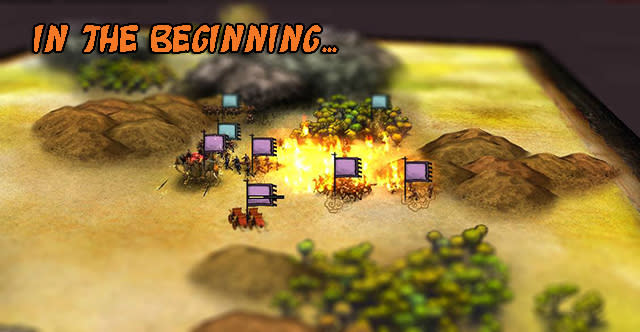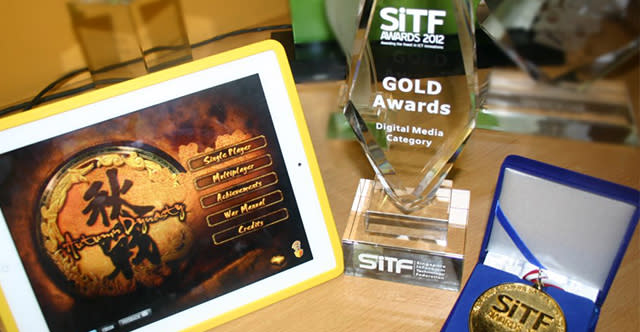Autumn Dynasty co-creator nearly chose dentistry over game development
Several years ago, Jeffrey Jiang agreed to help Travis Ho with the graphics programming in the latter’s game, and history was made. The Singaporean duo went on to form Touch Dimensions and produce Autumn Dynasty, an iPad game that took the world by surprise.
Autumn Dynasty combined real-time strategy with ancient China. Gestures on the iPad screen translated into brush strokes a la Okami, Chinese troops ran hither-thither on screen, and it was enchanting.
Just a year later in 2014, Touch Dimensions self-published Autumn Dynasty: Warlords a real-time strategy and city management—and are planning for an expansion. The company looks set to soar, but before you can fly, you always need to learn to walk. How did Touch Dimensions go from a simple skill trade-off between programmers to the game development studio it is today?
(See: Autumn Dynasty: Warlords review: conquerin’ ain’t easy)
33 year old Jeffrey Jiang used to work at a local startup called Envisage Reality. Back then, 29 year old Travis Ho was also working part time for the same outfit. That was how the two founders of Touch Dimensions met.
Ho eventually let slip to Jiang that he was working on a real-time strategy game project inspired by Playstation 2 game Okami, and that he needed help with the graphics programming. Coincidentally, Jiang also needed help with the AI of the game he was working on. As was the current practice between Travis and Envisage Reality back then, they decided to do a trade.
But it was more than just a simple trade. Jiang and Ho had “a lot of fun” working together, and when Jiang realized that Envisage Reality no longer wanted to work on games, he suggested they commercialize the Autumn Dynasty project.
Autumn Dynasty had never been meant to be the commercial success it is today. In fact, it had originally been created just for the Independent Games Festival in 2009. “After [Travis] had done the game, the plan was for him to say, let’s stop making games, and go into dentistry,” Jiang shared.
I’d rather have a nifty iPad game than a skewer in my mouth.
Ho hailed from a medical background, and his family wanted him to continue in their footsteps. He studied computational biology at the National University of Singapore, and taught himself to program by cloning 8-bit games. At that point, Ho was in the midst of his hiatus from school, a hiatus he had taken especially to do his final game project. But he agreed.
Touch Dimensions began in July 2009. Jiang and Ho set up a base of operations in the basement of Ho’s house and started work.
A total of five full timers and several additional part-time staff were involved in the original Autumn Dynasty. Some were childhood friends, some were friends of friends, some, they even met online. The team had dedicated people for sound, music, multiplayer networking, portrait painting, and level design.
“It was a crazy move,” Jiang recalled. He had sold his flat to support himself during that period, and shifted into a rental one with his father. “Most people thought I was crazy, including my dad,” though he said that his father was still supportive overall.
There were many issues along the way, such as miscommunication between Jiang and Ho, and learning to start a business from scratch. They also had to do a lot of contract work to support their bootstrapping.
Autumn Dynasty won a Singapore infocomm Technology Federation award in 2012.
“Even though we talked about games, we meant different things,” Jiang explained. “Everyone has a different perspective,” he said. Jiang and Ho clashed often over the simplest of things, such as what each meant when they said “no”. Both of them hailed from very different socio-economic backgrounds and cultures, and both thought of the other as more idealistic.
Still, Ho believed this worked in their favor. “There needs to be this tension,” he says, calling it “necessary” in creative industries.
The one thing that didn’t stump the duo was their focus on making Autumn Dynasty a premium app.
(See: From the other side of the fence: one developer’s thoughts on in-app purchases)
“We have a strong opinion on freemium,” Jiang said. He recounted how Ho and himself once saw a friend overspend on a freemium game’s cards before Christmas, and ended up broke for the occasion. There was another instance where a friend of theirs, who is a father, got so addicted to a famous game that he spent a month’s worth of pay—with a newborn kid waiting for him at home.
“I’m a developer,” Jiang said. “But watching people spending money they can’t afford doesn’t make me feel good.”
L-R: Jeffrey Jiang and Travis Ho.
Today, Touch Dimensions works out of the Games Solution Centre (GSC) in Singapore’s famous Block 71, having moved there in November 2012. Four people from the original Autumn Dynasty team went back to work on Warlords, and the company had five people working on it in total. The contract Jiang and Ho originally had with Autumn Dynasty publisher Bulkypix has ended, and they are now self-publishing.
There’s a strong camaraderie between Jiang and Ho. As the interview neared its end they told me about how Ho tries out microwave recipes in the GSC’s pantry and how nobody wants to try eating his concoctions. We talked a little bit about what would happen in the future for their company, plans they want to keep under wraps for a while longer.
It has been several exciting years for Touch Dimensions, and I can foresee even better ones ahead. Having already learned to fly, you wonder just how high they’re going to go.
The post Autumn Dynasty co-creator nearly chose dentistry over game development appeared first on Games in Asia.







